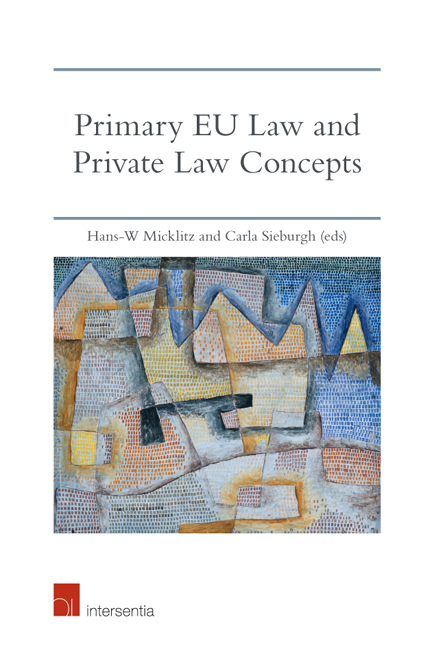Book contents
- Frontmatter
- Preface
- Summaries of the Chapters
- Contents
- Table of Cases: Alphabetical
- Table of Cases: Chronological
- List of Authors
- Chapter 1 Primary EU Law and Private Law Concepts
- Chapter 2 The Impact of Free Movement of Goods and Services on Private Law Rights and Remedies
- Chapter 3 The Impact of Free Movement of Capital on Private Law
- Chapter 4 The Impact of Competition Law on the Private Law Concepts of Nullity and Damages
- Chapter 5 The Impact of Article 101(2) TFEU Nullity on Private Law
- Chapter 6 The Impact of EU State Aid Law on National Private Law
- Chapter 7 The Impact of EU Intellectual Property Law and the Charter on Private Law Concepts
- Index
Chapter 7 - The Impact of EU Intellectual Property Law and the Charter on Private Law Concepts
Published online by Cambridge University Press: 27 September 2018
- Frontmatter
- Preface
- Summaries of the Chapters
- Contents
- Table of Cases: Alphabetical
- Table of Cases: Chronological
- List of Authors
- Chapter 1 Primary EU Law and Private Law Concepts
- Chapter 2 The Impact of Free Movement of Goods and Services on Private Law Rights and Remedies
- Chapter 3 The Impact of Free Movement of Capital on Private Law
- Chapter 4 The Impact of Competition Law on the Private Law Concepts of Nullity and Damages
- Chapter 5 The Impact of Article 101(2) TFEU Nullity on Private Law
- Chapter 6 The Impact of EU State Aid Law on National Private Law
- Chapter 7 The Impact of EU Intellectual Property Law and the Charter on Private Law Concepts
- Index
Summary
INTRODUCTION
When I was studying in the United Kingdom, one of my favourite television series was the BBC series ‘Silent Witness’. Since I did not have a television, I would usually watch the latest episode on BBC iPlayer, the website on which the BBC broadcasts its television programmes on the Internet, the day after it had been broadcasted on television. When I moved to Italy to start my PhD research, it became impossible to watch ‘Silent Witness’ online, because the programmes on BBC iPlayer can only be watched from within the United Kingdom. As a result, the only solution for me was to buy the DVD after the series had finished. This year I discovered, to my surprise, that the episodes were made available on YouTube. This was obviously not done by the BBC itself and the episodes would usually be taken off YouTube a few days after they had been uploaded. However, this was enough for me to be able to watch the most recent episode. Therefore, I did not have to buy the DVD this year.
This short personal story perfectly illustrates the tension between the protection of intellectual property rights and the Internet. The Internet provides a platform which can be used by entrepreneurs for commercial exploitation. At the same time, there is so much information on the Internet that it has become very difficult – if not impossible – for them to control the flow of information. This causes particular problems for holders of intellectual property rights, who might find that their films, songs or other works of art, on which they have oft en spent a significant amount of time and resources, are freely available on the Internet. The complicated technology behind the Internet and the constant technological developments make it practically very difficult for intellectual property rights holders to take adequate action against parties who breach their rights on the Internet. If we return to my personal example, there would be a number of things the BBC could do if it wanted to take action against the uploading of ‘Silent Witness’ episodes on YouTube.
- Type
- Chapter
- Information
- Primary EU Law and Private Law Concepts , pp. 241 - 270Publisher: IntersentiaPrint publication year: 2017
- 1
- Cited by

